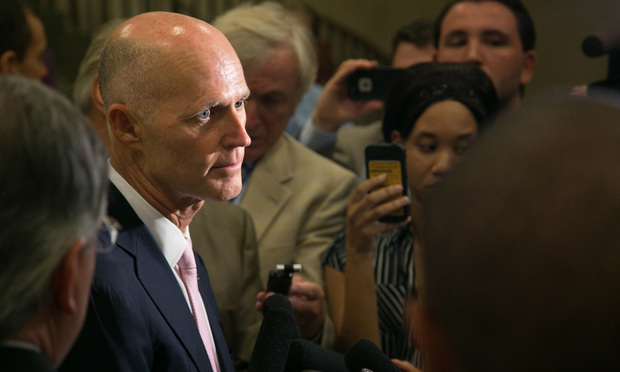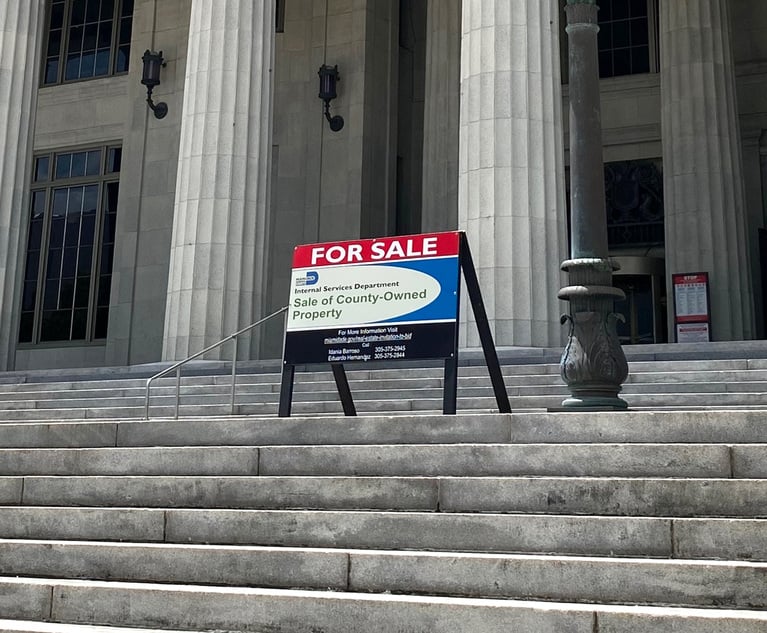Florida Republicans May Be Forced to Act on Voting Rights
Confronted with a federal judge's looming deadline, Florida Gov. Rick Scott called an extraordinary late-night meeting of top state officials Wednesday…
April 25, 2018 at 12:13 PM
3 minute read

Confronted with a federal judge's looming deadline, Florida Gov. Rick Scott called an extraordinary late-night meeting of top state officials Wednesday to decide what to do about the state's process for restoring voting rights to former prisoners.
U.S. District Judge Mark Walker gave Florida until Thursday to create a new process after ruling in February that the state's system is unconstitutional and arbitrary, with decisions possibly swayed by politics and racial factors.
The state sought to put Walker's ruling on hold, but an appeals court hasn't acted on that request, so Scott scheduled a clemency board meeting for 9:30 p.m.
The board consists of Scott, Attorney General Pam Bondi and two other elected Republicans. It's not clear yet what Florida's GOP officials will do to comply with the ruling, which the Scott administration has criticized as “haphazard.” The governor's office has said ultimate decisions on voting rights should be left to the governor and other state officials.
The clash comes as Scott campaigns for the U.S. Senate seat of Democrat Bill Nelson in a state where as many as 1.5 million felons remain disenfranchised despite having served their sentences and otherwise paid their debts to society.
Florida's constitution automatically bars felons from being able to vote after leaving prison, and Walker's ruling left that ban intact. Instead, he took aim at how the state considers who should get their rights restored.
Under the current system, a former prisoner must wait between five and seven years before they can even ask to have their voting rights back. The governor and the three elected Cabinet members then decide each request individually, subject to the governor's unilateral veto.
It wasn't always this way. Shortly after taking office in 2007, then-Republican Gov. Charlie Crist convinced two of the state's three Cabinet members to approve rules allowing the parole commission to restore voting rights for non-violent felons without hearings, and ultimately more than 100,000 felons were allowed to vote again.
Scott and state officials changed the process in 2011, and since then fewer than 3,000 have had their rights restored.
Following up on his February ruling, Walker ordered the state in late March — without giving any specific instructions — to overhaul the process.
The clemency board — without holding a public meeting to discuss the ruling — appealed. Walker responded sharply, telling the state in early April to comply by Thursday.
“Rather than comply with the requirements of the United States Constitution, defendants continue to insist they can do whatever they want with hundreds of thousands of Floridians' voting rights and absolutely zero standards,” Walker wrote. “They ask this Court to stay its prior orders. No.”
Gary Fineout reports for the Associated Press.
This content has been archived. It is available through our partners, LexisNexis® and Bloomberg Law.
To view this content, please continue to their sites.
Not a Lexis Subscriber?
Subscribe Now
Not a Bloomberg Law Subscriber?
Subscribe Now
NOT FOR REPRINT
© 2025 ALM Global, LLC, All Rights Reserved. Request academic re-use from www.copyright.com. All other uses, submit a request to [email protected]. For more information visit Asset & Logo Licensing.
You Might Like
View All
Meta agrees to pay $25 million to settle lawsuit from Trump after Jan. 6 suspension
4 minute read

Attorney Emerges as Possible Owner of Historic Miami Courthouse Amid Delays of New Building

RFK Jr. Will Keep Affiliations With Morgan & Morgan, Other Law Firms If Confirmed to DHHS
3 minute readTrending Stories
- 1Apply Now: Superior Court Judge Sought for Mountain Judicial Circuit Bench
- 2Harrisburg Jury Hands Up $1.5M Verdict to Teen Struck by Underinsured Driver
- 3Former Director's Retaliation Suit Cleared to Move Forward Against Hospice Provider
- 4New York Judge Steps Down After Conviction for Intoxicated Driving
- 5Keys to Maximizing Efficiency (and Vibes) When Navigating International Trade Compliance Crosschecks
Who Got The Work
J. Brugh Lower of Gibbons has entered an appearance for industrial equipment supplier Devco Corporation in a pending trademark infringement lawsuit. The suit, accusing the defendant of selling knock-off Graco products, was filed Dec. 18 in New Jersey District Court by Rivkin Radler on behalf of Graco Inc. and Graco Minnesota. The case, assigned to U.S. District Judge Zahid N. Quraishi, is 3:24-cv-11294, Graco Inc. et al v. Devco Corporation.
Who Got The Work
Rebecca Maller-Stein and Kent A. Yalowitz of Arnold & Porter Kaye Scholer have entered their appearances for Hanaco Venture Capital and its executives, Lior Prosor and David Frankel, in a pending securities lawsuit. The action, filed on Dec. 24 in New York Southern District Court by Zell, Aron & Co. on behalf of Goldeneye Advisors, accuses the defendants of negligently and fraudulently managing the plaintiff's $1 million investment. The case, assigned to U.S. District Judge Vernon S. Broderick, is 1:24-cv-09918, Goldeneye Advisors, LLC v. Hanaco Venture Capital, Ltd. et al.
Who Got The Work
Attorneys from A&O Shearman has stepped in as defense counsel for Toronto-Dominion Bank and other defendants in a pending securities class action. The suit, filed Dec. 11 in New York Southern District Court by Bleichmar Fonti & Auld, accuses the defendants of concealing the bank's 'pervasive' deficiencies in regards to its compliance with the Bank Secrecy Act and the quality of its anti-money laundering controls. The case, assigned to U.S. District Judge Arun Subramanian, is 1:24-cv-09445, Gonzalez v. The Toronto-Dominion Bank et al.
Who Got The Work
Crown Castle International, a Pennsylvania company providing shared communications infrastructure, has turned to Luke D. Wolf of Gordon Rees Scully Mansukhani to fend off a pending breach-of-contract lawsuit. The court action, filed Nov. 25 in Michigan Eastern District Court by Hooper Hathaway PC on behalf of The Town Residences LLC, accuses Crown Castle of failing to transfer approximately $30,000 in utility payments from T-Mobile in breach of a roof-top lease and assignment agreement. The case, assigned to U.S. District Judge Susan K. Declercq, is 2:24-cv-13131, The Town Residences LLC v. T-Mobile US, Inc. et al.
Who Got The Work
Wilfred P. Coronato and Daniel M. Schwartz of McCarter & English have stepped in as defense counsel to Electrolux Home Products Inc. in a pending product liability lawsuit. The court action, filed Nov. 26 in New York Eastern District Court by Poulos Lopiccolo PC and Nagel Rice LLP on behalf of David Stern, alleges that the defendant's refrigerators’ drawers and shelving repeatedly break and fall apart within months after purchase. The case, assigned to U.S. District Judge Joan M. Azrack, is 2:24-cv-08204, Stern v. Electrolux Home Products, Inc.
Featured Firms
Law Offices of Gary Martin Hays & Associates, P.C.
(470) 294-1674
Law Offices of Mark E. Salomone
(857) 444-6468
Smith & Hassler
(713) 739-1250






